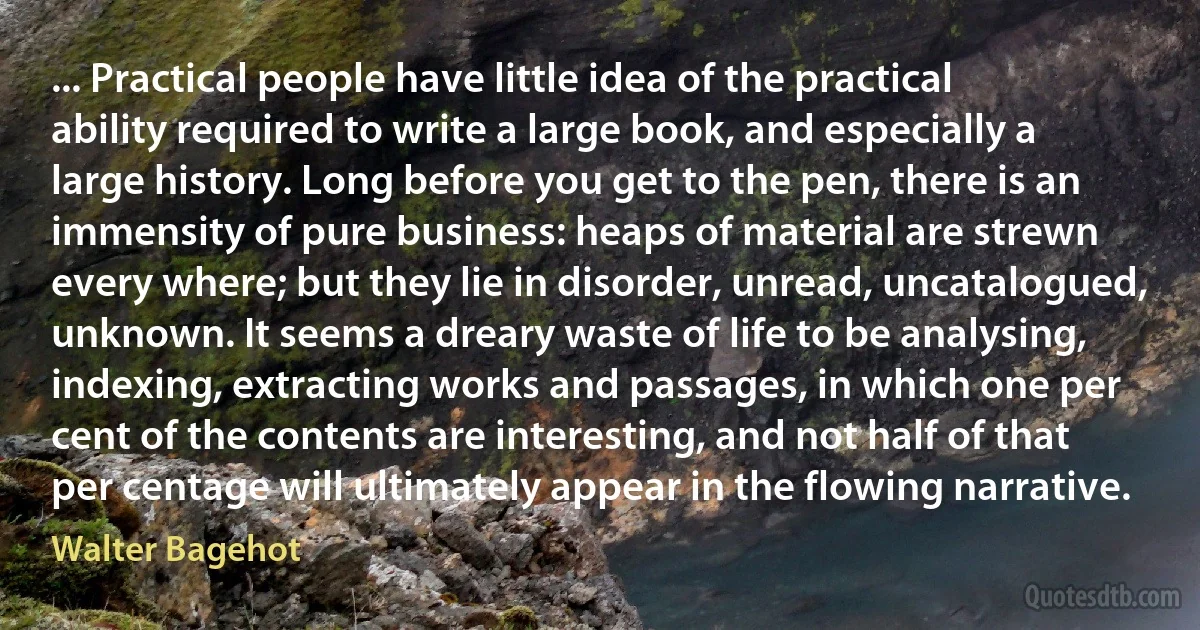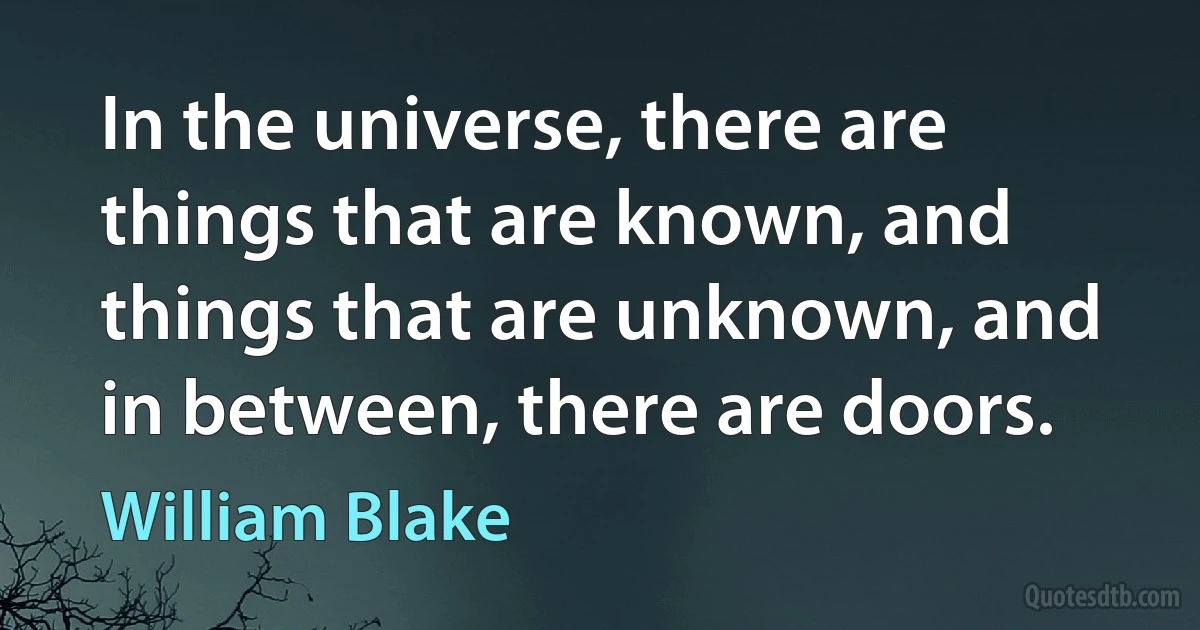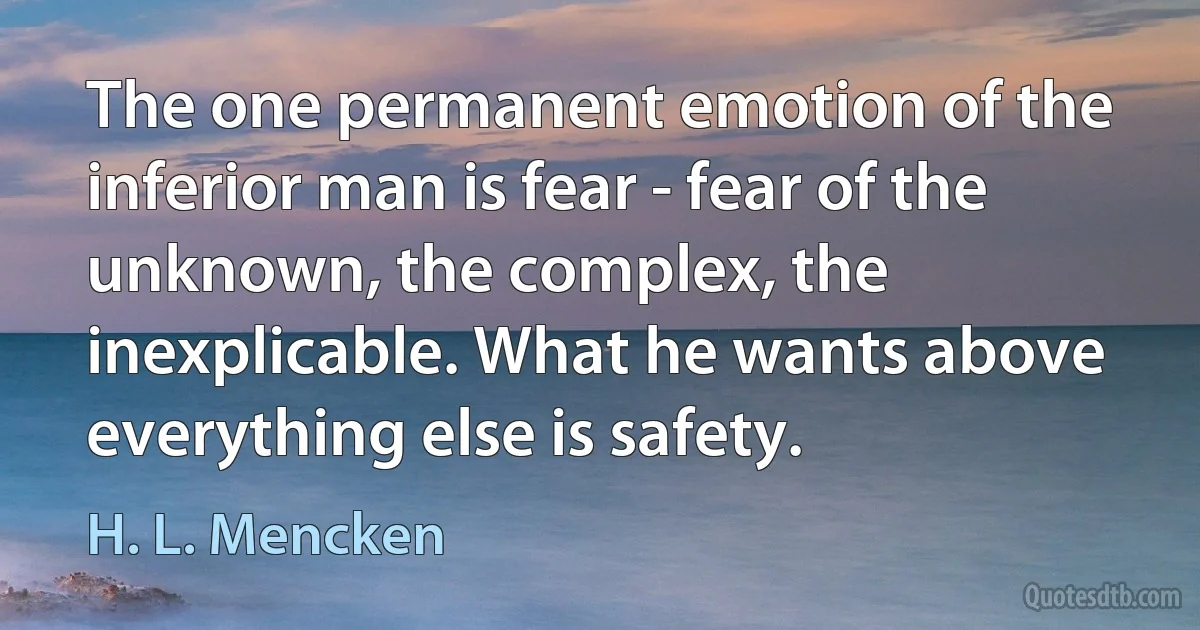Unknown Quotes - page 19
You need only look around you, replied PHILO, to satisfy yourself with regard to this question. A tree bestows order and organisation on that tree which springs from it, without knowing the order; an animal in the same manner on its offspring; a bird on its nest; and instances of this kind are even more frequent in the world than those of order, which arise from reason and contrivance. To say, that all this order in animals and vegetables proceeds ultimately from design, is begging the question; nor can that great point be ascertained otherwise than by proving, a priori, both that order is, from its nature, inseparably attached to thought; and that it can never of itself, or from original unknown principles, belong to matter.

David Hume
Again, we should notice the force, effect, and consequences of inventions, which are nowhere more conspicuous than in those three which were unknown to the ancients; namely, printing, gunpowder, and the compass. For these three have changed the appearance and state of the whole world; first in literature, then in warfare, and lastly in navigation: and innumerable changes have been thence derived, so that no empire, sect, or star, appears to have exercised a greater power and influence on human affairs than these mechanical discoveries.

Francis Bacon
The present painter can be said to work with chaos not only in the sense that he is handling the chaos of the blank picture plane, but also in that he is handling the chaos of form. In trying to go beyond the visible and the known world he is working with forms that are unknown even to him. He is therefore engaged in a true act of discovery in the creation of new forms and symbols that will have the living quality of creation.

Barnett Newman
Our feeling of ignorance, vanity, want, weakness, in short, depravity and corruption, reminds us ... that in the Lord, and none but He, dwell the true light of wisdom, solid virtue, exuberant goodness. We are accordingly urged by our own evil things to consider the good things of God; and, indeed, we cannot aspire to Him in earnest until we have begun to be displeased with ourselves. For what man is not disposed to rest in himself? Who, in fact, does not thus rest, so long as he is unknown to himself; that is, so long as he is contented with his own endowments, and unconscious or unmindful of his misery? Every person, therefore, on coming to the knowledge of himself, is not only urged to seek God, but is also led as by the hand to find him.

John Calvin
That higher and "complete" man is begotten by the "unknown" father and born from Wisdom, and it is he who, in the figure of the puer aeternus-"vultu mutabilis albus et ater"-represents our totality, which transcends consciousness. It was this boy into whom Faust had to change, abandoning his inflated onesidedness which saw the devil only outside. Christ's "Except ye become as little children" is a prefiguration of this, for in them the opposites lie close together; but what is meant is the boy who is born from the maturity of the adult man, and not the unconscious child we would like to remain.

Carl Jung
In archaic and traditional societies, the surrounding world is conceived as a microcosm. At the limits of this closed world begins the domain of the unknown, of the formless. On this side there is ordered - because of inhabited and organized - space; on the other, outside this familiar space, there is the unknown and dangerous region of the demons, the ghosts, and the dead and foreigners - in a world, chaos or death or night. This image of an inhabited microcosm, surrounded by desert regions as a chaos or a kingdom of the dead, has survived even in highly evolved civilizations such as those of China, Mesopotamia and Egypt.

Mircea Eliade
This swirl of stars,' Draconus suddenly said, 'marks the plunge of light into darkness. These stars, they are distant suns, shihing their light down upon distant, unknown worlds. Worlds, perhaps, little different from this one. Or vastly different. It hardly matters. Each star swirls its path towards the centre, and at that centre is death - the death of light, the death of time itself.

Steven Erikson
We document, explain, justify, construct, organize: these are good things, but we do not succeed in coming to the whole... But we may as well calm down: construction is not absolute. Our virtue is this: by cultivating the exact we have laid the foundations for a science of art, including the unknown X.

Paul Klee
To me, adventure is a concept that applies only to those men and women of earlier historical times, like the mediaeval knights who travelled into the unknown. The concept has degenerated constantly since then... I absolutely loathe adventurers, and I particularly hate this old pseudo-adventurism where the mountain climb becomes about confronting the extremes of humanity.

Werner Herzog
Just as divorce according to the Saviour's word was not permitted from the beginning, but on account of the hardness of our heart was a concession of Moses to the human race, so too the eating of flesh was unknown until the deluge. But after the deluge, like the quails given in the desert to the murmuring people, the poison of flesh-meat was offered to our teeth. ... At the beginning of the human race we neither ate flesh, nor gave bills of divorce, nor suffered circumcision for a sign. Thus we reached the deluge. But after the deluge, together with the giving of the law which no one could fulfil, flesh was given for food, and divorce was allowed to hard-hearted men, and the knife of circumcision was applied, as though the hand of God had fashioned us with something superfluous. But once Christ has come in the end of time, and Omega passed into Alpha and turned the end into the beginning, we are no longer allowed divorce, nor are we circumcised, nor do we eat flesh.

Jerome
In our secret depths, wherever we do our unspoken wishing, either we want life to be tidy, clear, fully understood, contained within definite limits, or we long for it to seem larger, wilder, stranger. Faced with some odd incident, either we wish to cut it down or to build it up.
On this level, below that of philosophies and rational opinions, either we reject or ignore the unknown, the apparently inexplicable, the marvellous and miraculous, or we welcome every sign of them. At one extreme is a narrow intolerant bigotry, snarling at anything outside the accepted world-picture, and at the other is an idiotic credulity, the prey of any glib charlatan. At one end the world becomes a prison, at the other a madhouse.

J. B. Priestley



